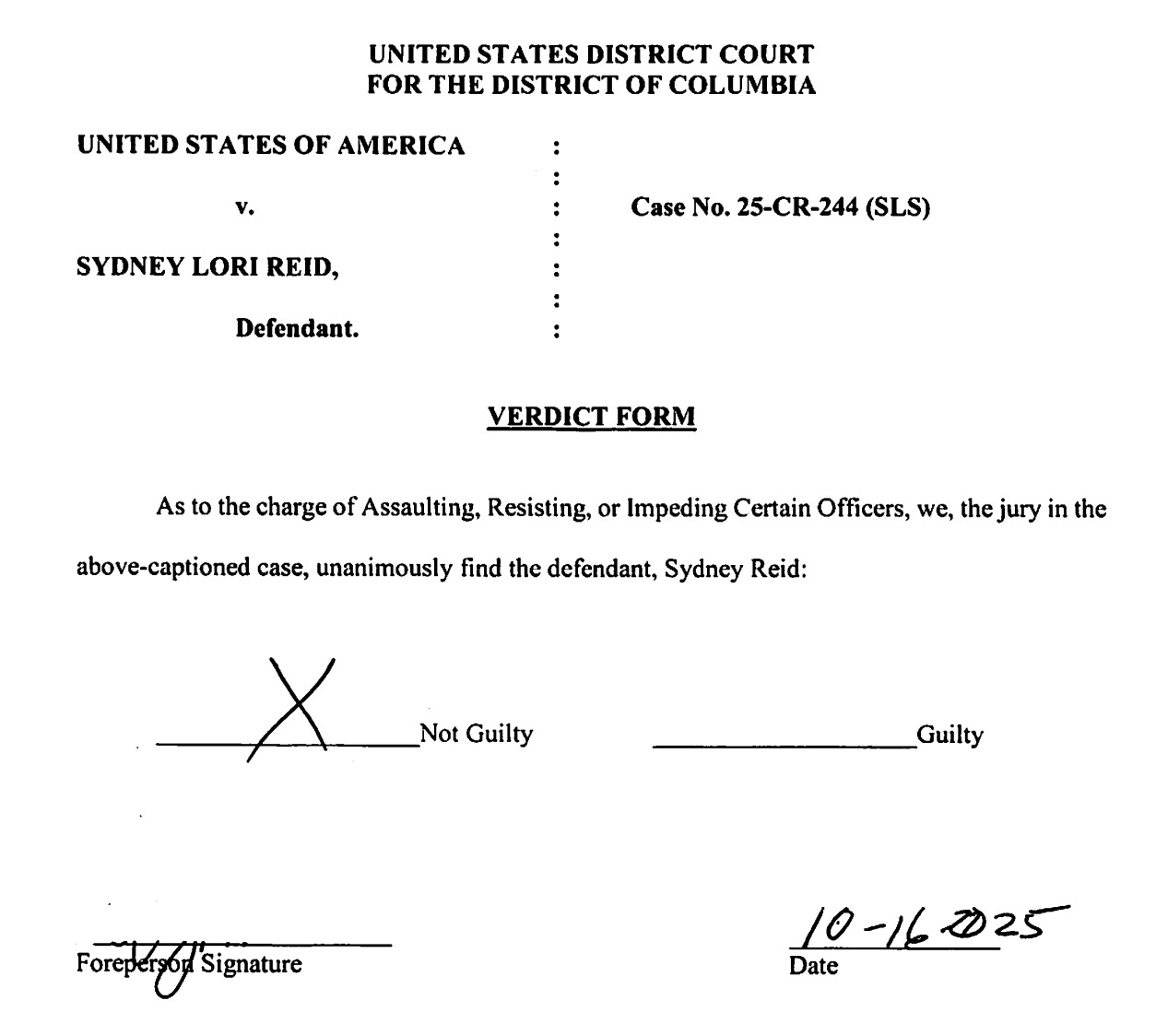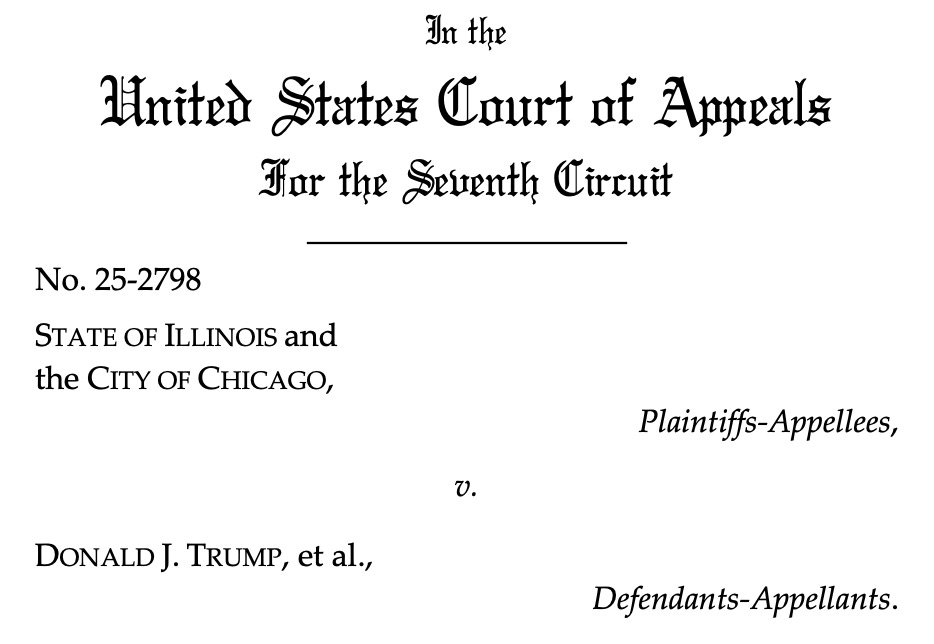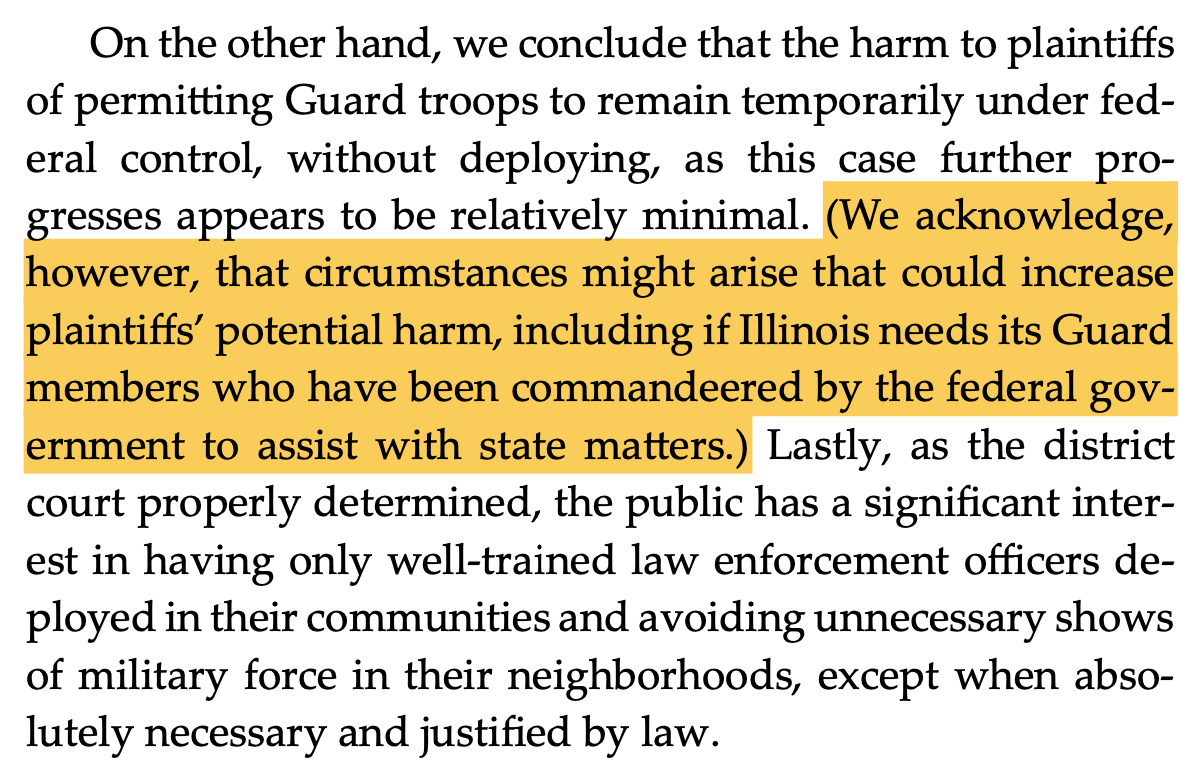"Not Guilty"
A not-at-all-subtle reminder to Trump that he's just the president — and that means his power is limited. And: The Seventh Circuit keeps troop deployment blocked in Illinois.
In less than two hours on Thursday afternoon, President Donald Trump got a pair of sharp reminders that he’s just the president of the United States of America — an elected official whose powers are limited under the Constitution and who ultimately answers to the people.
At 1:35 p.m. ET Thursday, a note was sent within the federal courthouse in Washington, D.C.
“Judge, We have reached a verdict.”
Soon thereafter, Sidney Reid found out that a jury of her peers had found her “Not Guilty” of the misdemeanor charge of “Assaulting, resisting, or impeding certain officers or employees“ that the U.S. Attorney’s Office in D.C. — headed by Jeanine Pirro — had filed against Reid after it failed three times to get a grand jury to indict her on felony charges in connection with a protest of immigration enforcement on July 22.
The trial, as WUSA9 reported, “had been marred by several issues with prosecutors’ evidence.” After the three-day trial concluded with closing statements on Thursday morning, WUSA9 reported that the jury deliberated for less than two hours before deciding the prosecutors had not even made their misdemeanor case.
A Seventh Circuit order
Less than two hours later after that verdict, a trio of judges — including two appointed by Republican presidents — rejected the Trump administration’s effort to deploy troops in Chicago while litigation challenging the effort is ongoing.
In a per curiam, unsigned opinion, a three-judge panel of the U.S. Court of Appeals for the Seventh Circuit declared that “the facts do not justify the President’s actions in Illinois under § 12406, even giving substantial deference to his assertions” in denying the Justice Department’s request for a stay of U.S. District Judge April Perry’s temporary restraining order pending appeal.
Judges Ilana Rovner, a George H.W. Bush appointee; David Hamilton, an Obama appointee; and Amy St. Eve, a Trump appointee issued the unanimous order holding, addressing the facts, as set forth at the district court; the TRO from Perry; the appeal of that TRO; the law — 10 U.S.C. 12406 — that has been relied upon by the Trump administration in its efforts to federalize the National Guard in California, Oregon, and Illinois; and the application of the law to those facts, as known at this time.
It was a sharp, 18-page opinion that delves concisely and well into the issues — regular legal debates in recent months due to Trump’s continued efforts to send troops into American cities.
From the start, the opinion read as a rejoinder — subtle though it may have been — to criticism leveled at the U.S. Supreme Court for its shadow-docket actions: “We draw our account from the district court’s factual findings in its opinion granting the temporary restraining order.“
Appellate courts — including the Supreme Court — are supposed to accept district courts’ factual findings unless they are “clearly erroneous,” but the shadow docket rulings (in addition to merits rulings) from the Supreme Court have regularly been criticized for failing to uniformly apply that standard of review. At the Seventh Circuit, the district court’s factual findings were key — as they should be.
When it came to the legal discussion, the opinion was similarly on point. In addressing the portion of the Trump administration’s argument supporting its claim that the National Guard could be federalized to address a “rebellion or a danger of a rebellion,” the opinion declared:
A protest does not become a rebellion merely because the protestors advocate for myriad legal or policy changes, are well organized, call for significant changes to the structure of the U.S. government, use civil disobedience as a form of protest, or exercise their Second Amendment right to carry firearms as the law currently allows. Nor does a protest become a rebellion merely because of sporadic and isolated incidents of unlawful activity or even violence committed by rogue participants in the protest. Such conduct exceeds the scope of the First Amendment, of course, and law enforcement has apprehended the perpetrators accordingly. But because rebellions at least use deliberate, organized violence to resist governmental authority, the problematic incidents in this record clearly fall within the considerable daylight between protected speech and rebellion.
It was as clear a paragraph I’ve seen dismantling the administration’s arguments while acknowledging virtually any and all of the harms the administration claims in its defense of its military actions.
As the panel concluded, “At this stage, we cannot say the administration is likely to succeed in demonstrating that the President lawfully federalized the Guard under either § 12406(2) or § 12406(3).”
When addressing the “irreparable harm” factor in considering whether to grant the Trump administration’s stay request, the Seventh Circuit panel quickly — but notably — mentioned the Texas National Guard issue.
“[T]he deployment of National Guard members from Texas—an incursion on Illinois’s sovereignty—makes the constitutional injury especially significant,” the opinion stated. “The balance of harms thus weighs in plaintiffs’ favor regarding the deployment of the Guard.”
As has been the case with administrative stay rulings from the U.S. Court of Appeals for the Ninth Circuit — as to Portland, Oregon — and the Seventh Circuit — as to Chicago — the panel here ruled to allow the actual federalization to remain in effect while preventing deployment. (Technically, the panel stayed the parts of the TROs that block the federalization itself, while not staying any parts of the TRO related to deployment.) This approach is the position now that multiple appellate judges have reached while this litigation continues — and before it heads, as seems inevitable, to the Supreme Court — in order to stop the harm without forcing a greater crisis than already exists.
With that in mind, I did find the Seventh Circuit’s discussion of that to be notable:
In other words, even that ruling is only for now. The panel is open to revisiting that if the Illinois National Guard members who are federalized — “who have been commandeered by the federal government” — are needed by Illinois.
There is a lot going on — and much of it is alarming.
It is important within that, though, to see how key pieces of the American governmental system — judges and juries — remain functioning.
It was a point that Reid and her lawyers made after Thursday’s verdict.1
On Thursday, we saw how those judges and juries remain able to see through the Trump smokescreen.
This sentence and the embedded post that follows were added shortly after publication.








I used to think, I wonder how the SCOTUS conservatives will justify doing [something Trump wants that contradicts any number of previous rulings]. Now we know they will do it on the shadow docket with no explanation.
How long will it take for SCOTUS to consider the merits of these challenges to National Guard deployments?
Can’t wait for jury duty this month. #FreeDC!